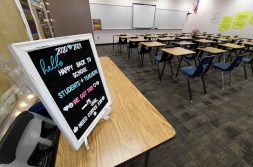Unlocking actionable data is critical for school districts, experts say

Many believe the reason educators don’t use more data is that they don’t have time to look at it, and 33 percent of districts and teachers say the real challenge is that the information they need is in too many places for them to access conveniently.
In a recent webinar hosted by edWeb.net, three experts — Jena Draper, founder and general manager of CatchOn, an edtech software company; Mike Schwab, who is on Google’s Education Team; and Suzy Brooks, an instructional technology director for Mashpee Public Schools in Massachusetts — said it is imperative that school districts address the tech usage data to drive success in classrooms.
Accessing that data comes with challenges that are becoming more common for educators. A majority of school districts in the United States either already have a 1:1 device program or plans to develop one.
And along with a 1:1 program comes a deluge of edtech tools into classrooms that districts are struggling to manage effectively. Seventy percent of edtech software licenses go unused and only 10 percent of teachers report knowing how often students should use that software.
“There are many tools out there, but many make it super difficult for schools to see how they are using the tools that they are paying money [for],” Schwab said. “This obstacle leads to funds used sub-optimally, which further compounds the problem of underfunded districts.”
This can also result in duplicative spending on software across various school buildings, said Brooks, especially if there is no centralized funding model. It’s critical that school districts “get a handle on” their digital tools and subscriptions, she said, because they’re hugely beneficial.
Empowered by data
One powerful tool, explained Draper, is data analytics, which can empower school districts to make informed technology decisions that influence student success. Data analytics tools give the visibility school districts need to transform data into meaningful and actionable insights.
With up-to-the-minute data analysis, districts can make informed decisions about critical components of edtech integration, including digital curricula, professional development, investment, and student data privacy.
No matter how much time teachers are given to work in data teams, tables and graphs can be so complicated that they can lose sight of how the data relates to a particular child, specific classroom or grade level. But when data is made understandable, stakeholders begin to make recommendations, provide interventions and plan for increasing student performance.
Getting there
Sixty percent of teachers say they need better training to integrate edtech tools into their teaching environments and identify the ideal targets for the majority of edtech programs they use in the classroom.
Underutilized tools require focused teacher training that makes the most of a district’s technology investments. Again, the speakers said, by using data analytics tools, educational leaders can pinpoint resources differences in usage to create targeted professional development and training plans.
Having access to usage data also encourages district leaders to have meaningful conversations with educators.
Don’t forget privacy
It is imperative that district leaders remain vigilant and mindful of the learning tools used in classrooms. Many developers use open source, standardized privacy policies, and this generic piecemeal approach to student data privacy policies can jeopardize student data, the speakers said.
Many educational apps become targets when school districts fail to protect student data, which often send personally identifiable information to third-party advertisers. Using data analytics tools can safeguard student-data privacy through the monitoring and tracking of every online resource used in classrooms. This is critical to ensure schools are compliant with current laws and standards such as the Children’s Online Privacy Protection Act.
About the presenters
After 10 years as an elementary teacher, Suzy Brooks is now the director of instructional technology for Mashpee Public Schools in Massachusetts. Additionally, she provides professional development and hands-on workshops for educators at local, regional and national venues. Her work in blended learning, student engagement, and social media has been featured by EdWeek, NBC News’s Education Nation, Instructor Magazine, Intel, ISTE, ASCD, Tech & Learning and the NEA. Currently, Suzy is a visiting lecturer at Fitchburg State University, a MassCUE Pathfinder and the Massachusetts ASCD President. Suzy holds a B.S. from Bridgewater State University and an M.Ed. in instructional technology from Lesley University.
Mike Schwab has spent his career in finance, enterprise software sales and edtech. Given his background in cloud computing and passion for education, he moved to the Google for Education Team in 2012 and was one of the first “Chromebooks for Education” team members. He has been working ever since to help bring Google for Education solutions to school districts around the country. He is passionate about working with districts as they move to the cloud and increase students’ access to technology.
Jena Draper is the founder and general manager at CatchOn, a company designed to support teaching and learning through the smarter use of data and technology. In 2016, she created CatchOn to help districts meet and adapt to changing instructional needs and trends through the use of real-time data and cutting-edge technology. Jena is passionate about improving how students learn with technology.
About the host
Monica Cougan joined ENA in 2012, where she currently serves as the product marketing manager. Bringing over 30 years of experience in technology integration, Monica oversees ENA’s partner program and product marketing initiatives. Monica’s prior work with education and the integration of technology in schools and districts, helps guide ENA’s work with education partners offering outstanding programs to schools. She has extensive experience in building collaborative network opportunities specifically videoconferencing and collaborative technologies. Monica continues to support national organizations advocating for the effective use of technology and supporting the needs of our education and library communities.
Join the community
Leadership and Innovation is a free professional learning community on edWeb.net that serves as an online forum for collaboration on leadership and innovation in schools to meet the needs of the next generation.
The edWeb webinar referenced above, sponsored by Education Networks of America (ENA) and CatchOn, can be found here.




